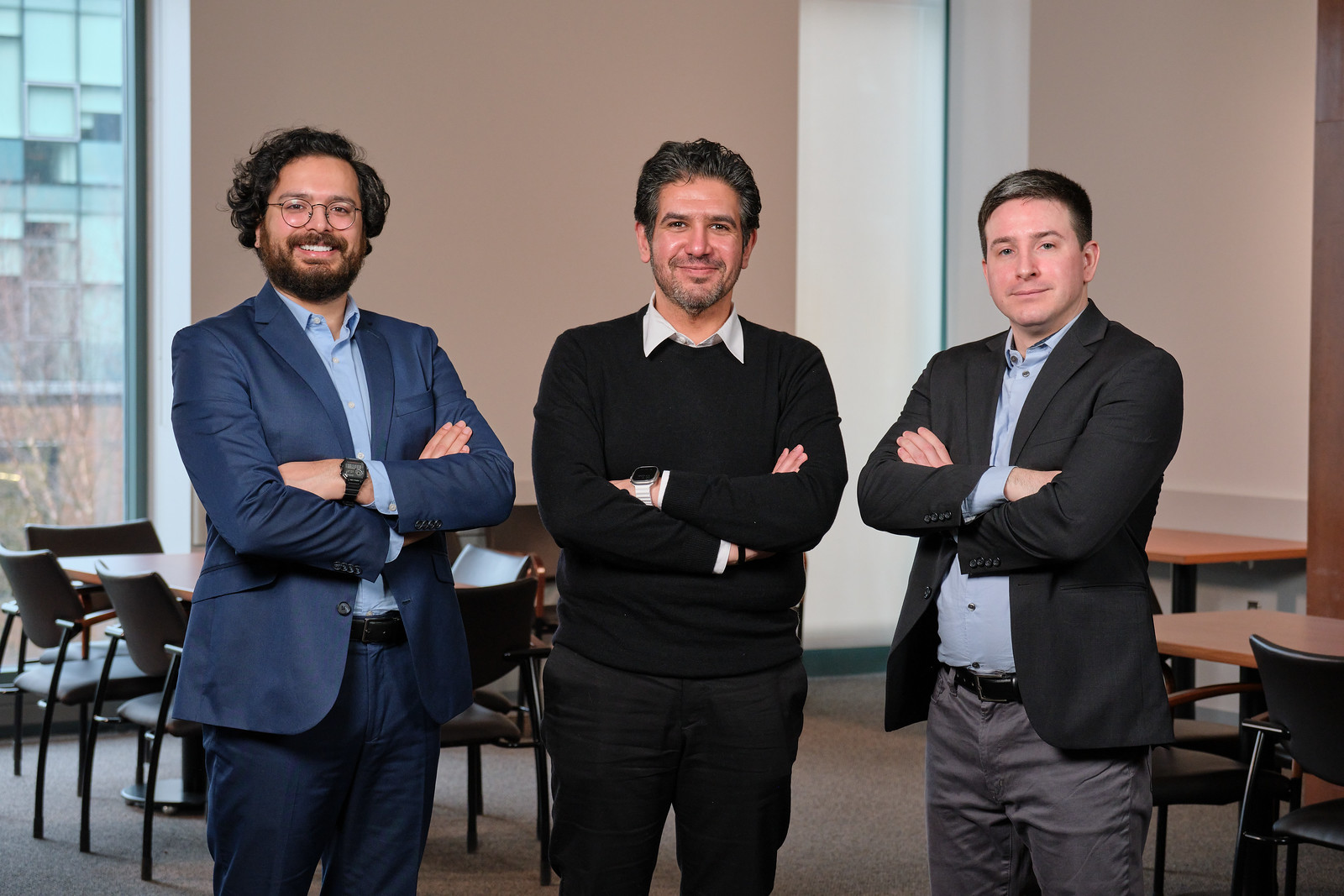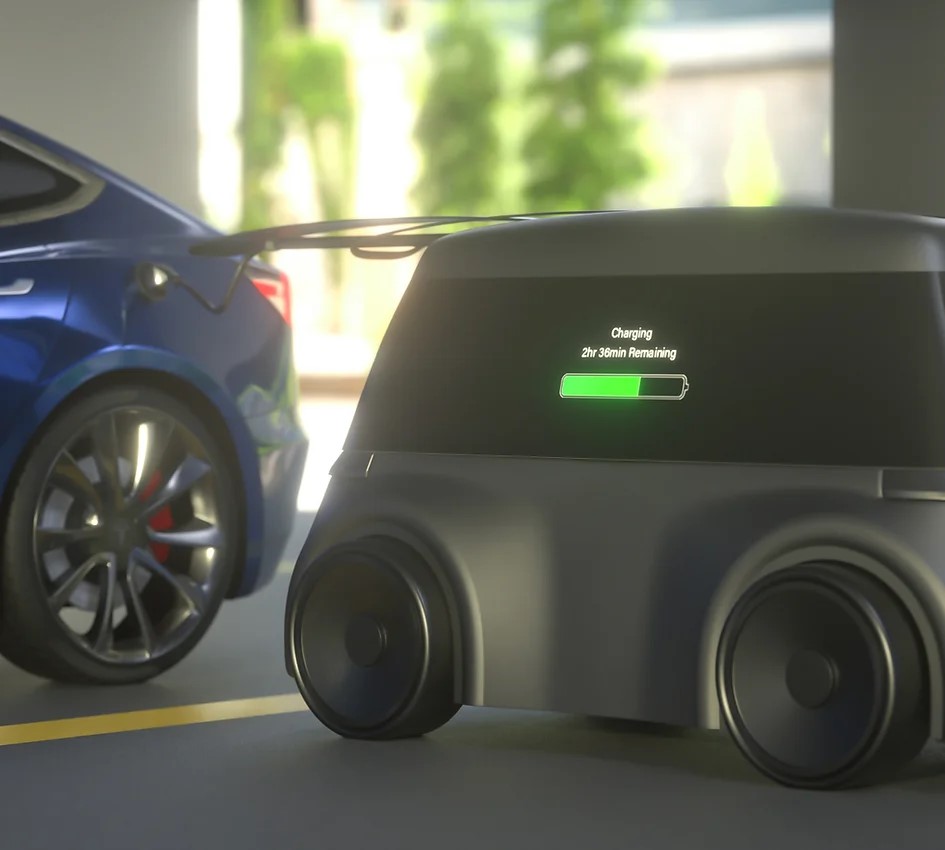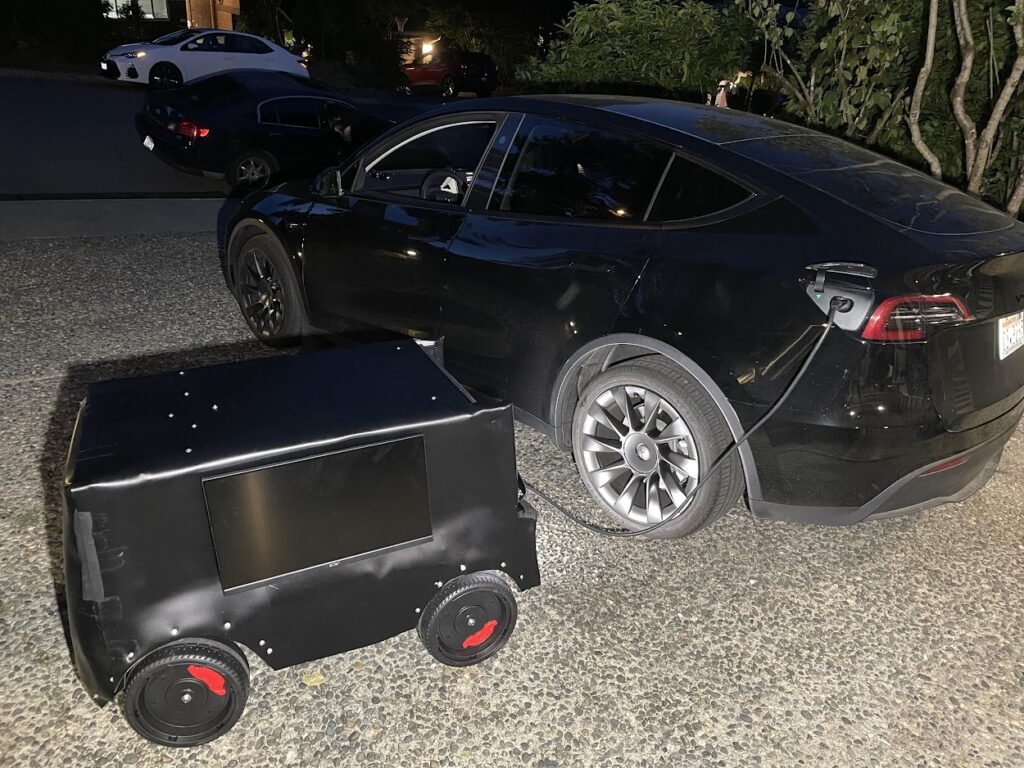
Foster Alumni Take Charge at Autev
Three MS in Entrepreneurship alumni launch a start-up with the promise of turning any parking spot into a charging station
As electric vehicles are increasingly commonplace, property owners face a conundrum. What is the optimal number of EV charging stations to install? Too few, and you are failing potentially affluent and loyal customers. Too many, and you have overinvested in expensive equipment and have reserved spaces sitting empty that would otherwise be occupied.
Enter Autev, a Seattle-based startup founded by three graduates of the UW Foster School of Business Masters of Entrepreneurship program. The trio, who met as classmates in the Foster program, have developed an innovative solution to this challenge. “Our robot turns every spot in a parking lot into an easy charging spot,” says technical advisor Jay Strickland (MS 2022).
Autev is building an autonomous robotic mobile charging unit. The unit could traverse multiple floors of a parking garage, powering EVs that are parked alongside conventional vehicles. When the robot itself runs low on power, it returns to a docking station and recharges before resuming its rounds.
Addressing range anxiety
“The infrastructure development is not matching the EV adoption in the market,” says founder and CEO Osama AlSalloum. “This leads to range anxiety among consumers, who are concerned about a multi-residential building that might only have four or five charging stations. What happens in two years, when there are more EV owners in that building?”
Autev solves this problem, enabling the charging of however many vehicles as needed. The robot can operate continuously, charging multiple different vehicles overnight via a scheduling system in which owners reserve a timeslot using a mobile application.
The three founders, AlSalloum, Strickland (MS 2022), and Syd Manna (MS 2022), are now in development of the second prototype of the device and meeting with potential contractors to scale and increase the speed at which they could bring the product to market.
“We view ourselves as a systems integrator. We want to leverage off the shelf systems as much as possible,” says Strickland. Doing so will enable Autev to progress much more quickly than developing its own proprietary components.
While the functionality of the system is paramount, Autev has also made the design a major focus. The robot’s look combines the friendly and the futuristic, with an aesthetic not far removed from the style of the EVs it will be charging.

“Design considerations are very important,” says Manna. “The unit has to be something that a customer would want to engage with. It has to look cool, futuristic, and convey that we are providing a premium service.”
AlSalloum notes it was a challenging task requiring multiple iterations to design a new product that has all the necessary capabilities and met the design criteria. “The design and the function of the arm was a result of an intensive six-month research and development process. In the end, our industrial designers came up with something that looks perfectly in place next to a Tesla.”
Armed with an innovative idea and compelling product, the Autev team have been attending trade show and industry events, where they say there has been strong interest from potential partners and future customers.
“We attended the Detroit Auto Show and met a lot of people from the automotive industry (who were enthusiastic). It was also valuable to see what was out there in terms of competition or alternate solutions that we could learn from.” says Manna.
Manna says this and other trade shows have provided confirmation that they are on the right path with a product that is very much in demand. “We had a lot of potential customers come up and talk to us, asking questions. They were all very eager for this product. It motivated us to move forward as quickly as possible.”
Autev in discussions with potential partners
With evidence of a receptive market, Autev is in discussions with potential investors. So far the partners have been bootstrapping the company, but are now in talks with venture capitalist for a seed round. The team is seeking backers who provide more than just a financial investment.
“We are being selective, because we want someone strategic that can help us to reach the next level,” says AlSalloum. “It’s not about the money. It’s about the value. Looking for the right partners is key.”
With these discussions underway, the team is also evaluating its financial models. The product could potentially be monetized by charging property owners, end users, or both. The model might differ based on location, and when combined, the two approaches would provide both significant one-time payments generating immediate revenue as well as recurring revenue from an ongoing subscription model.
Managing technical, logistical, and financial considerations requires a specific personality type. AlSalloum considers himself first and foremost an entrepreneur. While he is passionate about Autev, it is one of several businesses he’s worked on. He notes that venture capitalists invest in teams more than specific business ideas, and companies often end up pivoting.

In fact, the origins of Autev came from an earlier collaboration in which AlSalloum and Manna were working on a different concept around mobile charging of cell phones. AlSalloum recognized the explosive growth in the EV sector, and the duo decided to pivot to a more ambitious project in which some of the same concepts could be applied to cars.
The duo reached out to their Foster classmate Strickland to see if he would want to come onboard. He jumped at the chance, and brings invaluable technical expertise from his role as a portfolio analyst at The Energy Authority, a nationwide solutions provider to the utility industry.
All three co-founders credit the Foster Masters of Science Entrepreneurial program with providing a foundation to launch a successful start-up.
“The program provides a set of skills that you can use later on in your life in everything, not just necessarily running a business,” says Manna. “We’re seeing a lot of benefits from it.”
“The faculty and staff do a fantastic job making sure that everyone who steps in front of the classroom, whether that’s an outside speaker who’s active in industry or one of the professors, lives the Foster values,” adds Strickland.
The founders established a set of values for Autev very early on, committing to a customer-centric approach with the potential to positively contribute to one of today’s most pressing issues.
Customer-centric core values
“Our core values are essential because they dictate how we run our company and how we market our product,” says AlSalloum. “Our core values are centered on our customer. We want to make sure our customers are satisfied because it’s through them that we’re able to exist.”
By providing a superior customer experience, Autev promotes the use of a more environmentally sound automotive choice. The team is planning to enable their stations to return power to the grid, offsetting costs and creating a more sustainable future.
“The need for distributed and adaptive energy resources that can change according to the demand on the grid is incredibly important,” says Strickland. “Having distributed batteries combined with other renewable assets helps improve the resiliency of our grid overall.”
It is that promise of making their business a success while positively contributing to a brighter future that fuels Autev. As Strickland says, “if you can’t build something that actually has impact, then it’s not truly an innovation.”
